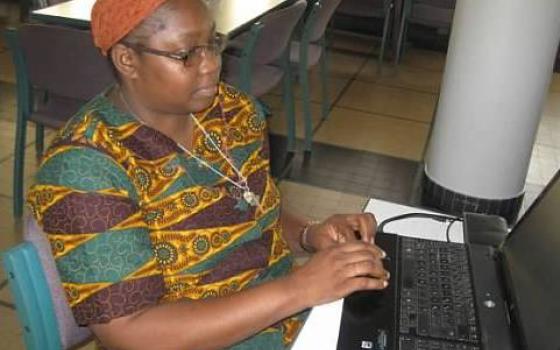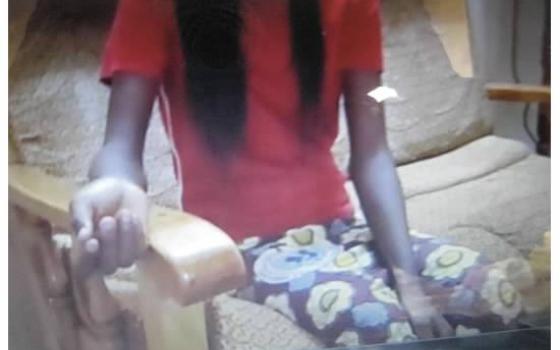See also, an overview of Nigeria's laws and what sisters are doing - Human trafficking in Nigeria: Sisters provide services, seek greater justice for all by Eucharia Madeuke
A year has passed since a global jolt awoke the world when over 200 girls were kidnapped in Nigeria on April 14, 2014. Across the world a chant resounded: “Bring Back our Girls.” It seems now the world has fallen to sleep, numb to the peril of girls; or maybe events just pass too rapidly to keep attention. If global Twitter campaigns and the voices of first ladies and prime ministers in globally dominant countries have no effect, what will wake us again?
So it remains, all over the world, one by one, in quiet media-neglected places girls go missing over and over. Here are bits of stories of two girls who were trafficked from Nigeria to Burkina Faso. They are young women really (in their early 20s), but they refer to themselves as girls and their stories expose hearts of girlhood. I know these stories from an interview I had March 15 with Sr. Yvonne Bambara, director of Havre du Bon Pasteur, a reception and reintegration program begun in 2012 by Sisters of the Good Shepherd, and from short videos each girl did before returning to Nigeria.
Both stories begin in poverty. One orphan girl was working as a singer, the other worked in a restaurant; each left rural poverty for the promise of the city. The stories also begin in hope. I know hope as a theological virtue, but for these girls hope was a desperate naiveté which nevertheless may have something to do with relationship with God and desire for the good.
Each story presents a tragic journey of crumbling belief. One girl protests: “No, I can’t do that kind of work. He said I would work in a restaurant.” She is made to put on the short skirt and a brassier, go out to the street and bring back money. The other girl, as she recounts her story, even after safety and recuperation in a shelter, continually repeats the refrain of the promise given months ago of “going to America.” This clung-to phrase is heard at least 30 times in a 15-minute video; it seems she cannot give up the hope that a better life, some money for her family, is meant for her. Of course she never reached America; she reached an isolated mining area of Burkina Faso where men work far from their families and grope for the women on the street each night. Daytime activities for the girls consist of beatings and lock-ins and deprivation of food. This girl saw many girls die and some who “went crazy.” Another oft repeated phrase, as the story is told, is a dark shadow of hope defeated: “I’m crying . . . I’m just crying. . . .”
A particularly heartbreaking turn comes for one when being prostituted results in a pregnancy. The house matron forced the girl to drink a liquid concoction resulting in death in the womb without expulsion. This crisis resulted in near death and hospitalization for this young woman, revealing further complications of chronic heart problems. Nevertheless, the hospital stay, along with saving her life, gave her the opportunity to run away. She found aid from two Burkinabé girls, strangers to her, taken to government social services then to Havre du Bon Pasteur. She had been four months in prostitution then spent three months at the shelter before returning to Nigeria. Her health remains frail, having lost over 100 pounds, and she has a chronic need for heart medication which she cannot afford.
The other girl had been six months in prostitution and also got out by running away; she met a student, a stranger to her, who took her to his family who then took her to the government agency, resulting in Sr. Yvonne’s shelter care for three months. Hope, it seems then, can also be a stranger who reveals compassion, some kind of mercy sent from God.
When girls are lost, as these are, one by one, the world sleeps on. Or maybe it is just too busy with something. Sr. Yvonne would like to wake the world up, shake the world up – citizens and government alike. She is concerned how little she has to offer the girls; government provides no financial support. She yearns for a full staff for programming development and follow-up care; the girls still contact her from Nigeria. Beyond direct care, Yvonne can articulate well the first need for prevention: education and employment prospects for youth. What happened to grand government promises of free universal primary education? Sr. Yvonne knows family strength is good prevention as well, but these girls suffered weak family links, too much time alone, too little support.
So many speeches about “family first” and family values – but where are the support programs for employment, health and relation building? Havre du Bon Pasteur would like the ability to do, hand in hand with direct care, advocacy for stronger public awareness and stronger public policy. Sr. Yvonne speaks of lax border security between countries, where persons being trafficked pass without passports; what happened to international crime conventions? And she can talk forcefully about the need for stronger laws and prosecution; a current six-month jail sentence now being served by the female pimp (of a husband-wife team – he recruits in Nigeria, she manages the girls who come to Burkina) is not commensurate to running a house where girls have died, “gone crazy” and endured pregnancies with risk of death.
These two girls are alive and have returned to Nigeria. The most immediate goal they express upon leaving Havre du Bon Pasteur, is to tell all the girls in Nigeria to be aware of false promises, to stay home. But how will they negotiate lack of education and circumstances of poverty?
Beyond sadness and horror, these stories provoke questions: questions about wakefulness, questions about hope, questions about being a stranger and meeting a stranger, questions about the direction of the world’s resources, questions of life and death and about the mystery of God’s mercy. Commitment to such questions requires staying awake and repeating the stories, one by one, again and again.
[Sr. Clare Nolan is the International Justice Training Coordinator for the Sisters of the Good Shepherd, an international woman’s religious congregation that is involved in providing social services in about 70 counties, with a particular focus on women and girls in vulnerable situations.]
Related - Human trafficking in Nigeria: Sisters provide services, seek greater justice for all by Eucharia Madeuke


